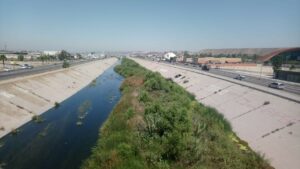December 16, 2020
 Baja’s Water Management, Sanitation, and Protection Agency (SEPROA) announced a project to provide much needed maintenance, repairs, and upgrades to the Punta Bandera wastewater treatment plant in Tijuana to help reduce transboundary pollution impacting our region. The project is estimated to cost $600 million pesos (about $30 million USD) with half of the funding provided by Mexico’s National Infrastructure Fund (FONADIN), National Bank of Public Works and Services (BANOBRAS), and the Mexican Federal Government, and the remaining provided by Baja’s State Government. The Punta Bandera wastewater treatment plant has been inactive for the last decade. The reactivation of Punta Bandera will contribute greatly to reducing transboundary polluted flows, and will potentially help address agriculture irrigation shortages in Ensenada.
Baja’s Water Management, Sanitation, and Protection Agency (SEPROA) announced a project to provide much needed maintenance, repairs, and upgrades to the Punta Bandera wastewater treatment plant in Tijuana to help reduce transboundary pollution impacting our region. The project is estimated to cost $600 million pesos (about $30 million USD) with half of the funding provided by Mexico’s National Infrastructure Fund (FONADIN), National Bank of Public Works and Services (BANOBRAS), and the Mexican Federal Government, and the remaining provided by Baja’s State Government. The Punta Bandera wastewater treatment plant has been inactive for the last decade. The reactivation of Punta Bandera will contribute greatly to reducing transboundary polluted flows, and will potentially help address agriculture irrigation shortages in Ensenada.
After the completion of their 60-day project to remove over 300,000 cubic meters of sediment and solid waste along the 28 kilometers of the Tijuana River channel, SEPROA continues to work on upgrades to key water and wastewater infrastructure in Tijuana and Rosarito, while identifying the main sources of pollution. These upgrades, along with increased coordination with U.S. authorities, are estimated to reduce the volume of northbound transboundary flows during dry weather by 70 percent and have already resulted in fewer northbound flows reported.
In California, Governor Newsom signed a bill that requires the state’s Environmental Protection Agency to create a Watershed Action Plan for the Tijuana River Valley. SB 1301, authored by Sen. Hueso, also looks to address cross-border challenges in the watershed’s management and creates a framework for how U.S. and Mexican agencies can work together to mitigate polluted flows.
The Chamber continues to advocate for efforts to advance infrastructure projects that will help mitigate pollution and minimize water deficits to the U.S. To fulfill that goal, the Chamber participates as a member of the International Boundary and Water Commission’s (IBWC) Binational Core Working Group that meets periodically to provide advice and advance infrastructure solutions, and has submitted letters that have helped secure funding at the state and federal level on both sides of the border to implement these projects moving forward.